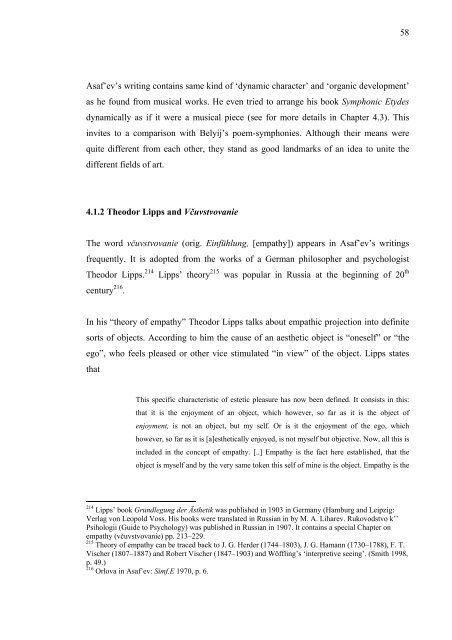Boris Asaf'ev and the Soviet Musicology - E-thesis
Boris Asaf'ev and the Soviet Musicology - E-thesis
Boris Asaf'ev and the Soviet Musicology - E-thesis
You also want an ePaper? Increase the reach of your titles
YUMPU automatically turns print PDFs into web optimized ePapers that Google loves.
Asaf’ev’s writing contains same kind of ‘dynamic character’ <strong>and</strong> ‘organic development’<br />
as he found from musical works. He even tried to arrange his book Symphonic Etydes<br />
dynamically as if it were a musical piece (see for more details in Chapter 4.3). This<br />
invites to a comparison with Belyij’s poem-symphonies. Although <strong>the</strong>ir means were<br />
quite different from each o<strong>the</strong>r, <strong>the</strong>y st<strong>and</strong> as good l<strong>and</strong>marks of an idea to unite <strong>the</strong><br />
different fields of art.<br />
4.1.2 Theodor Lipps <strong>and</strong> Včuvstvovanie<br />
The word včuvstvovanie (orig. Einfühlung, [empathy]) appears in Asaf’ev’s writings<br />
frequently. It is adopted from <strong>the</strong> works of a German philosopher <strong>and</strong> psychologist<br />
Theodor Lipps. 214 Lipps’ <strong>the</strong>ory 215 was popular in Russia at <strong>the</strong> beginning of 20 th<br />
century 216 .<br />
In his “<strong>the</strong>ory of empathy” Theodor Lipps talks about empathic projection into definite<br />
sorts of objects. According to him <strong>the</strong> cause of an aes<strong>the</strong>tic object is “oneself” or “<strong>the</strong><br />
ego”, who feels pleased or o<strong>the</strong>r vice stimulated “in view” of <strong>the</strong> object. Lipps states<br />
that<br />
This specific characteristic of estetic pleasure has now been defined. It consists in this:<br />
that it is <strong>the</strong> enjoyment of an object, which however, so far as it is <strong>the</strong> object of<br />
enjoyment, is not an object, but my self. Or is it <strong>the</strong> enjoyment of <strong>the</strong> ego, which<br />
however, so far as it is [a]es<strong>the</strong>tically enjoyed, is not myself but objective. Now, all this is<br />
included in <strong>the</strong> concept of empathy. [..] Empathy is <strong>the</strong> fact here established, that <strong>the</strong><br />
object is myself <strong>and</strong> by <strong>the</strong> very same token this self of mine is <strong>the</strong> object. Empathy is <strong>the</strong><br />
214 Lipps’ book Grundlegung der Äs<strong>the</strong>tik was published in 1903 in Germany (Hamburg <strong>and</strong> Leipzig:<br />
Verlag von Leopold Voss. His books were translated in Russian in by M. A. Liharev. Rukovodstvo k’’<br />
Psihologii (Guide to Psychology) was published in Russian in 1907. It contains a special Chapter on<br />
empathy (včuvstvovanie) pp. 213–229.<br />
215 Theory of empathy can be traced back to J. G. Herder (1744–1803), J. G. Hamann (1730–1788), F. T.<br />
Vischer (1807–1887) <strong>and</strong> Robert Vischer (1847–1903) <strong>and</strong> Wöffling’s ‘interpretive seeing’. (Smith 1998,<br />
p. 49.)<br />
216 Orlova in Asaf’ev: Simf.E 1970, p. 6.<br />
58

















